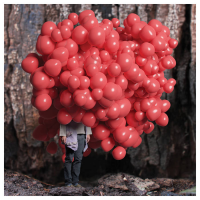Home » Jazz Articles » We Travel the Spaceways » The Volcanic World Of Pyroclastic Records
The Volcanic World Of Pyroclastic Records
What happens then when a label's mission statement zigs when you expect a comfortable zag? Enter composer/pianist/educator Kris Davis' Pyroclastic Records, founded in 2016 "to support those artists whose expression flourishes beyond the commercial sphere." Maybe read that quote again, "to support those artists whose expression flourishes beyond the commercial sphere." Is that a suicidal mission statement? Yes, but not if you have the bona fides of an artist like Davis. Since moving to New York nearly twenty years ago from her native Calgary, Alberta, Canada, she has distinguished herself both as a leader, collaborator, and side musician with artists such as Jon Irabagon, Ingrid Laubrock, Tony Malaby, Tyshawn Sorey, John Zorn, Craig Taborn, Eric Revis, Terri Lyne Carrington, and Michael Formanek, to name but a few. Her music can be found on labels such as Clean Feed, Tzadik, Intakt, Astral Spirits, and ECM.
Add to that list Pyroclastic Records. Pyroclastic, as in the fragments of rock spewed from an erupting volcano. Think of these releases as hot magma, but also the building blocks of island chains that appear from seemingly nowhere birthing new civilizations. Okay, maybe we've gone a bit too far with this analogy, but Davis' Pyroclastic Records is all about advancement and enlightenment. In it's brief existence, founded in 2016, the label has turned heads with several recordings voted 'best of the year' releases. Let's take a brief look at the catalog, and please search AAJ's database for more in depth reviews of individual titles.
 Pyroclastic's debut was the CD/DVD Duopoly (2016) with Davis performing one composed and one improvised track with eight different musicians, including Don Byron, Tim Berne, Marcus Gilmore, Billy Drummond, Angelica Sanchez, Craig Taborn, Julian Lage, and Bill Frisell. The accompanying DVD illustrates just how the so-called 'sausage is made,' by allowing the eye to decipher what the ear is taking in. Davis would return to this duo format with pianist Craig Taborn on Octopus (2018) culling tracks from the pair's live performance recordings. The duos reveal Taborn to be cut from the very same cloth as Davis. Their two pianos, whether prepared or not, are two sides of the same coin. Best example is their other worldly take on Sun Ra's "Love In Outer Space," which could be received as chamber music that flowers otherworldly.
Pyroclastic's debut was the CD/DVD Duopoly (2016) with Davis performing one composed and one improvised track with eight different musicians, including Don Byron, Tim Berne, Marcus Gilmore, Billy Drummond, Angelica Sanchez, Craig Taborn, Julian Lage, and Bill Frisell. The accompanying DVD illustrates just how the so-called 'sausage is made,' by allowing the eye to decipher what the ear is taking in. Davis would return to this duo format with pianist Craig Taborn on Octopus (2018) culling tracks from the pair's live performance recordings. The duos reveal Taborn to be cut from the very same cloth as Davis. Their two pianos, whether prepared or not, are two sides of the same coin. Best example is their other worldly take on Sun Ra's "Love In Outer Space," which could be received as chamber music that flowers otherworldly.  Jumping forward to 2020 and Pyroclastic releases Taborn's Junk Magic Compass Confusion. Eschewing acoustic piano for electric keyboards and synthesizer, Taborn revisits his 2004 Thirsty Ear eponymous group's release with saxophonist Chris Speed, Erik Fratzke (bass), Mat Maneri (viola), and David King (drums). The music often begins in ambient prairies before populating territories through improvisation and electronic processing. For Taborn the electronics never eclipse the improvised and humanoid contributions. There's electronic sound that could be mistaken for Harry Bertoia's sonambient sound sculptures which grow into the pings from deep space. Some Pyroclastic releases might just be missives from the future, like Davis' Diatom Ribbons (2019) which was voted by many critics one of the year's finest releases. Here she weaves Cecil Taylor's voice, some poetry, and Julius Hemphill's spirit around acoustic and electronic gestures with celebrated guests Carrington, Esperanza Spalding, Nels Cline, JD Allen, Ches Smith, and Marc Ribot.
Jumping forward to 2020 and Pyroclastic releases Taborn's Junk Magic Compass Confusion. Eschewing acoustic piano for electric keyboards and synthesizer, Taborn revisits his 2004 Thirsty Ear eponymous group's release with saxophonist Chris Speed, Erik Fratzke (bass), Mat Maneri (viola), and David King (drums). The music often begins in ambient prairies before populating territories through improvisation and electronic processing. For Taborn the electronics never eclipse the improvised and humanoid contributions. There's electronic sound that could be mistaken for Harry Bertoia's sonambient sound sculptures which grow into the pings from deep space. Some Pyroclastic releases might just be missives from the future, like Davis' Diatom Ribbons (2019) which was voted by many critics one of the year's finest releases. Here she weaves Cecil Taylor's voice, some poetry, and Julius Hemphill's spirit around acoustic and electronic gestures with celebrated guests Carrington, Esperanza Spalding, Nels Cline, JD Allen, Ches Smith, and Marc Ribot. That nod to poetry can be found on clarinetist Ben Goldberg's Good Day For Cloud Fishing (2019). Taking the poems of Dean Young, Goldberg fashions music for himself, Nels Cline and Ron Miles to which Young writes new poems while listing to the performances. The release is packaged with both the before and after poetry, so the listener can also get into the act. Jazz yes, but this is also literature, art, and a clear elucidation of improvisation.
 As we set sail upon these creative waters, Pyroclastic is an advocate of pianist/artist/composer Cory Smythe, releasing his trio Circulate Susanna (2018) and more recently Accelerate Every Voice (2020). His latest release features five vocalists, piano, bass, and electronic sampling with Andrew Hill's choral Lift Every Voice (Blue Note, 1970) as inspiration. The vocal music is thoughtful and as adventurous as it gets. So too is the sixth edition of Nate Wooley's epic song-cycle Seven Storey Mountain VI (2020). The concept of this cycle is to simulate the ecstatic experience described by Trappist Monk Thomas Merton in his book of the same name.
As we set sail upon these creative waters, Pyroclastic is an advocate of pianist/artist/composer Cory Smythe, releasing his trio Circulate Susanna (2018) and more recently Accelerate Every Voice (2020). His latest release features five vocalists, piano, bass, and electronic sampling with Andrew Hill's choral Lift Every Voice (Blue Note, 1970) as inspiration. The vocal music is thoughtful and as adventurous as it gets. So too is the sixth edition of Nate Wooley's epic song-cycle Seven Storey Mountain VI (2020). The concept of this cycle is to simulate the ecstatic experience described by Trappist Monk Thomas Merton in his book of the same name.  Each iteration of SSM builds upon the previous by adding players and intensity. The single 45-minute track opens and closes with a 21-person choir, building intensity throughout. Its major theme is the text from Peggy Seeger's 1979 song "Reclaim the Night" with its protest against sexism and gendered violence. The performance with its samples and electronics resembles the intensity of John Coltrane's "Ascension," but with more of a symmetrical arc.
Each iteration of SSM builds upon the previous by adding players and intensity. The single 45-minute track opens and closes with a 21-person choir, building intensity throughout. Its major theme is the text from Peggy Seeger's 1979 song "Reclaim the Night" with its protest against sexism and gendered violence. The performance with its samples and electronics resembles the intensity of John Coltrane's "Ascension," but with more of a symmetrical arc. Angelica Sanchez and Marilyn Crispell perform the two-piano duet How to Turn The Moon (2020). Both artists are established piano voices in the improvisational world, and this right channel/left channel conversation was crafted from seven Sanchez originals and three improvisations. The original material was comprised of minimal sketches for the pair to develop. This tête-à-tête takes place both inside the piano and at the keyboards, reminding listeners that the piano is both a percussive and harmonic instrument.
 Kris Davis has been a long standing member of Eric Revis' trio and can be heard on several Clean Feed Records releases including City Of Asylum (2013), Crowded Solitudes (2016) and Sing Me Some Cry (2017) which also includes saxophonist Ken Vandermark. She returns on Slipknots Through a Looking Glass (2020) along with the two-saxophone frontline of Bill McHenry and Darius Jones, and platoon drummers Chad Taylor and Justin Faulkner. The bassist-led quartet presents complex yet swinging music, delivered by an ensemble of extremely strong-willed characters. The sound is both disciplined and challenging. Concepts which this lineup finds neither disparate nor irreconcilable. This release will be a strong contender for jazz album of the year.
Kris Davis has been a long standing member of Eric Revis' trio and can be heard on several Clean Feed Records releases including City Of Asylum (2013), Crowded Solitudes (2016) and Sing Me Some Cry (2017) which also includes saxophonist Ken Vandermark. She returns on Slipknots Through a Looking Glass (2020) along with the two-saxophone frontline of Bill McHenry and Darius Jones, and platoon drummers Chad Taylor and Justin Faulkner. The bassist-led quartet presents complex yet swinging music, delivered by an ensemble of extremely strong-willed characters. The sound is both disciplined and challenging. Concepts which this lineup finds neither disparate nor irreconcilable. This release will be a strong contender for jazz album of the year.
Tags
We Travel the Spaceways
Mark Corroto
Braithwaite & Katz Communications
Kris Davis
Jon Irabagon
Ingrid Laubrock
TONY MALABY
Tyshawn Sorey
john zorn
Craig Taborn
Eric Revis
Terri Lyne Carrington
Michael Formanek
Don Byron
Tim Berne
Marcus Gilmore
Billy Drummond
Angelica Sanchez
Julian Lage
Bill Frisell
Sun Ra
Chris Speed
Mat Maneri
Cecil Taylor
Julius Hemphill
Esperanza Spalding
Nels Cline
JD Allen
Ches Smith
Ron Miles
Cory Smythe
Andrew Hill
nate wooley
John Coltrane
Marilyn Crispell
Ken Vandermark
Bill McHenry
Darius Jones
Chad Taylor
Justin Faulkner
Pyroclastic Records
PREVIOUS / NEXT
Support All About Jazz
 All About Jazz has been a pillar of jazz since 1995, championing it as an art form and, more importantly, supporting the musicians who make it. Our enduring commitment has made "AAJ" one of the most culturally important websites of its kind, read by hundreds of thousands of fans, musicians and industry figures every month.
All About Jazz has been a pillar of jazz since 1995, championing it as an art form and, more importantly, supporting the musicians who make it. Our enduring commitment has made "AAJ" one of the most culturally important websites of its kind, read by hundreds of thousands of fans, musicians and industry figures every month.





















